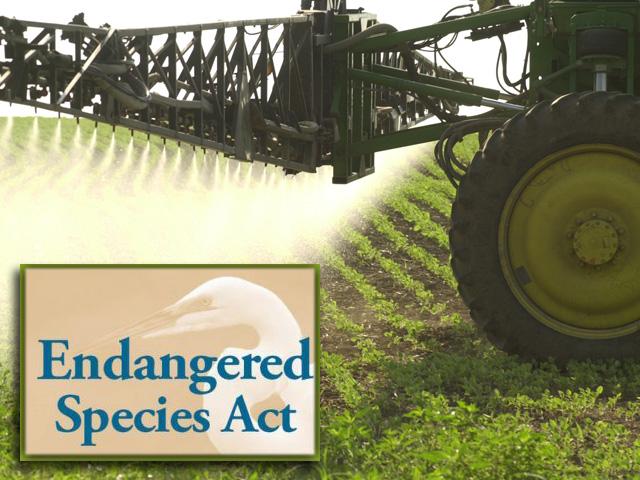ESA Rule Cuts Habitat Harm Definition
Trump Administration Moves to Cut 'Harm' Definition From Endangered Species Act Habitat Rules
LINCOLN, Neb. (DTN) -- The Trump administration issued a proposed rule to rescind the regulatory definition of "harm" in the Endangered Species Act as it relates to habitat modifications in a proposal released on Wednesday, in the latest action in what has been a regulatory back-and-forth from administration to administration on the law.
According to a proposal by the U.S. Fish and Wildlife Service, U.S. Department of the Interior and the National Oceanic and Atmospheric Administration, or NOAA, the current use of the term "harm" as it relates to the "taking" of endangered species, "runs contrary to the best meaning" of the statutory definition.
"We are undertaking this change to adhere to the single, best meaning of the ESA," the administration said in the proposed rule.
During the Biden administration, federal agencies continued reviewing pesticide registrations to ensure labels comply with the ESA as part of a legal settlement with environmental groups.
The U.S. Environmental Protection Agency under Biden began work on establishing a work plan related to mitigation measures to protect species from a range of pesticides. Read about that here: https://www.dtnpf.com/….
Legal settlements have played a significant role in how federal agencies comply with the ESA.
In April 2023, the U.S. Environmental Protection Agency and the Center for Biological Diversity reached a proposed settlement on the center's lawsuit alleging the EPA failed to conduct an ESA review in setting Renewable Fuel Standard volumes in June 2022. Read about that here: https://www.dtnpf.com/….
EXPANDED REACH
The proposed rule said previous ESA regulations "expanded" the ESA's reach "in ways that do not reflect the best reading of the statute, to prohibit actions that impair the habitat of protected species."
The Center for Biological Diversity said the rule would "rescind nearly all habitat protections for endangered species nationwide," in a news release on Wednesday.
P[L1] D[0x0] M[300x250] OOP[F] ADUNIT[] T[]
The ESA prohibits the "take" of endangered species by any person including individuals, government entities and corporations. The term has been further defined to cover actions that actually "harm" endangered species through "significant habitat modification or degradation."
The center said the proposal would "fully rescind this definition, opening the door for industries of all kinds to destroy the natural world and drive species to extinction."
LOPER BRIGHT RULING
The Trump administration points to the Supreme Court's June 2024 decision in Loper Bright Enterprises v. Raimondo, which overturned a key legal doctrine known as Chevron deference. Read about that here: https://www.dtnpf.com/….
Chevron deference required that if statutory language is clear, agencies were required to follow the letter of the law. If wording and context in a statute were ambiguous, courts previously deferred to federal agencies' discretion.
"Under Loper Bright, 'the question that matters' is whether 'the statute authorizes the challenged agency action,'" the proposed rule states.
"In other words, does the agency's regulation match the single, best meaning of the statute? We have concluded that our existing regulations, which still contain the definition of 'harm' contested in 'Sweet Home,' do not match the single, best meaning of the statute."
The Supreme Court's decision in Babbitt v. Sweet Home Chapter of Communities for a Great Oregon, upheld the USFWS's regulation using Chevron deference. The Trump administration proposal talks about a dissenting opinion by Justice Antonin Scalia, Chief Justice William Rehnquist and Justice Clarence Thomas.
"As Justice Scalia observed, 'if take were not elsewhere defined in the act, none could dispute what it means, for the term is as old as the law itself," the proposed rule states.
"To 'take' when applied to wild animals, means to reduce those animals by killing or capturing, to human control."
The Trump administration said a replacement definition was not needed because the ESA itself defines "take" and "further elaborating on one subcomponent of that definition 'harm' is unnecessary in light of the comprehensive statutory definition."
The proposed rule is scheduled for posting in the Federal Register on April 17, 2025, to include a 30-day public comment period.
LAWMAKERS INVESTIGATE ESA
Also on Wednesday, federal lawmakers launched an investigation into the Biden administration's expansion of the ESA, as members of the Committee on Oversight and Government Reform in the U.S. House of Representatives requested a briefing with staff at the U.S. National Marine Fisheries Service.
Trump issued a national energy emergency declaration and ordered federal agencies to identify "obstacles to domestic energy infrastructure" including the ESA or "other relevant laws."
In a letter to Emily Menashes, acting assistant administrator of the U.S. National Marine Fisheries Service, committee chairman Rep. James Comer, R-Ky., and Rep. Eric Burlison, R-Mo., chairman of the House Subcommittee on Economic Growth, Energy Policy and Regulatory Affairs, said there will be an "ESA Committee" convened to identify how the implementation of the law has created obstacles to energy production.
"The Endangered Species Act requires NOAA Fisheries to consult the secretary of commerce on whether a species should be listed as endangered or otherwise," the letter said.
"Environmentalist groups abused the ESA and regulations promulgated under its authority by filing a litany of lawsuits to create regulatory delays on infrastructure projects they oppose and to influence NOAA Fisheries' decisions. Under the Biden administration, NOAA Fisheries tailored ESA policies to conform with these groups' demands. In one instance, the Biden administration raised the bar for delisting a species from endangered status and sought to designate more habitats as critical habitats, even when endangered species living in those habitats are no longer found in those locations."
Todd Neeley can be reached at todd.neeley@dtn.com
Follow him on social platform X @DTNeeley
(c) Copyright 2025 DTN, LLC. All rights reserved.




